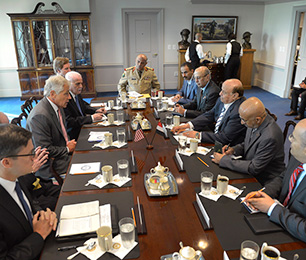SANAA, Yemen — The United States’ launching of eight drone strikes in Yemen in the span of 13 days has ignited widespread outrage in the country.
The anger over the strikes, which came as an al Qaida-related threat shuttered U.S. embassies and consulates in Yemen and 15 other countries, has overwhelmed attention to the threat itself, which many here view skeptically anyway.
“In the end, I think the American reaction has been far more than has been reasonable,” said Abdulghani al Iryani, a Sanaa-based political analyst. “It comes off almost as a show of strength. But, ultimately, it may end up backfiring, as al Qaida is getting more attention now than they would have even if they carried out an attack.”
The U.S. State Department announced Friday that it would reopen all its diplomatic missions Sunday except for the embassy in Yemen and the consulate in Lahore, Pakistan, which had been evacuated early in the day because of an unspecified threat. There was no word on when the embassy here might be reopened. On Tuesday, what the State Department called “non-emergency” embassy staff members were flown to Germany.
The surge of strikes, the most concentrated series of drone hits since 2002, has come in four provinces, Abyan in the south, Shabwa and Hadramawt in Yemen’s southeast and Mareb in the country’s center. That alone underscores the difficulty of combating al Qaida’s Yemen affiliate, al Qaida in the Arabian Peninsula.
Earlier this year, the central government was able to push one of al Qaida in the Arabian Peninsula’s main affiliates, Ansar al Shariah, from strongholds it had seized during the push by dissidents to topple the government of then-President Ali Abdullah Saleh. But the bulk of the fighters were able to escape to other parts of the country, including areas with comparatively little history of an al Qaida presence, such as Hadramawt, which has emerged as a focus of recent U.S. strikes.
A number of the strikes appear to have been aimed at senior al Qaida figures in this country, but it isn’t clear how many of the targets have been killed.
The first strike, on July 27 in the al Mahfad district of Abyan, was aimed at al Qaida in the Arabian Peninsula’s top bomb maker, Ibrahaim al Asiri, but he wasn’t among the four suspected militants killed.
Local tribal fighters who oppose the al Qaida group claimed that the next strike, on July 30, killed Ibrahim al Rubaish, a Saudi Arabian who’s its top ideologue and the successor to Saeed al Shihri as its deputy leader, but that hasn’t been confirmed. Shihri, a Saudi who was once held at Guantanamo, died in January of wounds he’d suffered in a November drone strike, but the group confirmed the death only last month.
While Western news reports have cast casualties of the next strike, on Aug. 1, as militants, locals in the area of Hadramawt where it took place have claimed that the dead had no links to the al Qaida group and included a child.
Five days later, a strike to the northwest, in Mareb, killed four, including two prominent figures in the group, one of whom was named in a list of wanted militants that the Yemeni government recently released. A strike the following day in Shabwa killed at least six, all cast as suspected fighters for the group.
Thursday saw the greatest drone activity, with three attacks on al Qaida targets, the first in Mareb and the second and third in southern Hadramawt, killing at least 11. The exact death toll and the identities of those killed remain unconfirmed.
Outrage over the strikes has spread to the capital, where the dismay over their frequency was heightened by their timing, during the final days of Ramadan and the start of the Eid al Fitr holiday, one of the holiest and most festive times of the Islamic year. The anger built on tensions caused by two days of unprecedented flyovers of the capital by one or more manned, American-made spy planes.
Yemeni officials have tied the spate of strikes to a plot by al Qaida in the Arabian Peninsula to seize major cities in the country’s south. But many here view suggestions of such a plot with unvarnished skepticism, saying the group doesn’t have the manpower to carry out such an ambitious operation.
Join us in defending the truth before it’s too late
The future of independent journalism is uncertain, and the consequences of losing it are too grave to ignore. To ensure Truthout remains safe, strong, and free, we need to raise $43,000 in the next 6 days. Every dollar raised goes directly toward the costs of producing news you can trust.
Please give what you can — because by supporting us with a tax-deductible donation, you’re not just preserving a source of news, you’re helping to safeguard what’s left of our democracy.
